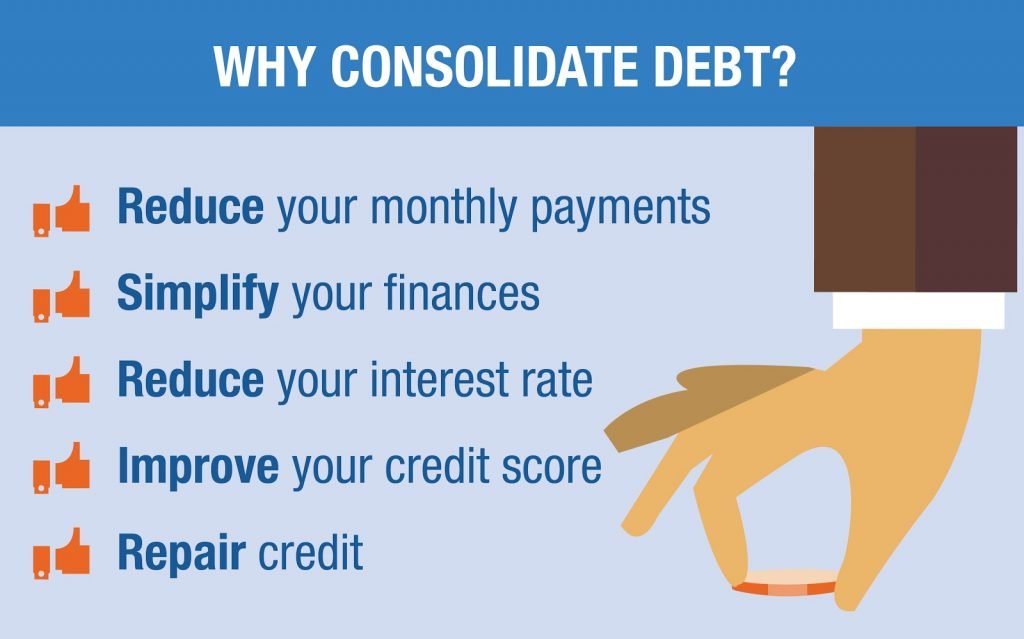Total debt consolidation loan is a powerful financial tool that brings multiple debts together into one manageable payment, giving you a fresh approach to tackling your finances. By streamlining what might otherwise be a messy collection of monthly bills, this solution offers a pathway for greater control and peace of mind.
This type of loan is specifically designed for people juggling several credit card balances, personal loans, or other unsecured debts, allowing them to combine everything into a single, often lower-interest, loan. It not only simplifies budgeting but can also reduce your overall monthly payments or interest rates, depending on your situation. Understanding how a total debt consolidation loan works can be the first step toward financial clarity and long-term stability.
Introduction to Total Debt Consolidation Loan
Total debt consolidation loans have become a popular financial solution for individuals struggling to manage multiple debts. This type of loan is designed to combine several outstanding debts into a single, more manageable loan with one monthly payment. The primary goal is to simplify repayment, often with a lower interest rate or extended term, making it easier for borrowers to regain control of their finances.
Total debt consolidation typically includes unsecured debts such as credit card balances, personal loans, medical bills, payday loans, and sometimes even utility arrears or store credit accounts. Secured loans like mortgages or auto loans are generally not included, unless specifically refinanced.
This approach can be particularly beneficial for people facing high interest rates across various debts, difficulty keeping up with multiple due dates, or those aiming to improve their overall credit profile by streamlining their obligations.
Key Features and Core Purpose
A total debt consolidation loan is fundamentally structured to replace several debt payments with just one, simplifying the borrower’s monthly financial commitments. The core purpose is not only convenience, but also potentially reducing the total interest paid and preventing missed payments that harm credit scores.
Common Debts Eligible for Consolidation

While not all debts can be consolidated, many common types are eligible. Understanding which debts qualify helps borrowers make informed decisions.
- Credit card balances from multiple issuers
- Personal loans and lines of credit
- Overdue utility or phone bills
- Medical and dental bills
- Store credit or installment plans
- Some payday or short-term loans
Situations Where Consolidation Loans Offer Value, Total debt consolidation loan
Total debt consolidation loans are valuable in specific circumstances, such as:
- When juggling multiple high-interest debts becomes overwhelming
- When existing monthly payments exceed a sustainable budget
- When seeking to avoid late fees or collection actions due to missed payments
- When aiming to boost credit scores by maintaining a regular payment record
- When desiring a clear repayment structure with an end date
“A total debt consolidation loan can be a turning point for borrowers who feel buried by scattered, high-interest debts, offering a single path towards financial freedom.”
How Total Debt Consolidation Loans Work
Understanding the mechanics of total debt consolidation loans helps borrowers approach the process with confidence. The journey starts with identifying eligible debts and shopping for a suitable consolidation product. After loan approval, funds are disbursed to pay off outstanding balances, leaving the borrower with a single consolidated loan to repay.
Step-by-Step Procedure for Applying for Consolidation Loans
Below is a structured overview of the application process, emphasizing the key actions and necessary attention points at each step.
| Step | Action | Requirements | Outcome |
|---|---|---|---|
| 1. Assessment | List all debts and calculate total amount owed | Debt statements, credit reports | Clear debt summary |
| 2. Application | Submit loan application to chosen lender | Personal info, debt details, income proof | Application in process |
| 3. Evaluation | Lender reviews credit and eligibility | Credit check, income verification | Approval or request for more documents |
| 4. Disbursement | Funds are paid directly to creditors or borrower | Loan agreement signed | Debts paid off, new loan begins |
Roles of Lenders and Borrowers in the Process
The relationship between lender and borrower is essential throughout consolidation. Lenders assess the borrower’s financial health, creditworthiness, and ability to repay, while borrowers must provide comprehensive documentation and accurate information. During disbursement, some lenders pay off debts directly, ensuring funds are used for the intended purpose, preventing misuse.
Borrowers are responsible for managing the new loan responsibly, adhering to the agreed payment schedule, and communicating any repayment challenges promptly to avoid further financial difficulty.
Benefits of Total Debt Consolidation Loans

Opting for a total debt consolidation loan offers multiple benefits that extend beyond financial relief. Properly managed, this loan can transform an overwhelming debt situation into a structured, goal-oriented pathway to freedom from debt.
Key Financial and Personal Advantages
The chief advantages of consolidating debts into a single loan are increased manageability and potential cost savings. Borrowers often experience less stress due to reduced payment complexity, and may enjoy improved financial discipline with a set payoff date.
- Streamlined monthly payments make budgeting easier
- Opportunity to secure a lower overall interest rate
- Potential to improve credit score if payments are made on time
- Elimination of multiple fees and varying due dates
- Clarity regarding debt-free timeline
Debt Consolidation Comparison: Consolidating vs. Managing Multiple Debts
Before deciding, it is helpful to directly compare the experience of managing consolidated versus separate debts.
- One payment vs. several scattered payments each month
- Single interest rate vs. multiple, often higher, rates
- Reduced administrative hassle vs. tracking different lenders and deadlines
- Improved negotiation power with a single creditor vs. less leverage with multiple creditors
- Increased focus on paying down principal vs. juggling interest and minimum payments
Long-Term Impacts on Credit Score and Budgeting

Consolidating debts can positively influence credit scores by lowering credit utilization rates and promoting on-time payments. However, if not managed well, missing payments on the new loan can still damage credit. On the budgeting front, predictable payment amounts make it easier to plan household expenses, and having a set loan term encourages discipline in reaching debt-free status.
Wrap-Up
Choosing a total debt consolidation loan can be a game changer for anyone struggling to keep up with multiple payments. By understanding the process, benefits, risks, and best practices, you can make informed decisions that pave the way to financial freedom. Remember, careful planning and responsible repayment are key to making the most of a consolidation loan and achieving lasting financial well-being.
Q&A
Can I include all types of debt in a total debt consolidation loan?
No, most total debt consolidation loans only cover unsecured debts like credit cards, personal loans, and medical bills. Secured debts such as mortgages and auto loans generally can’t be consolidated through this type of loan.
Will applying for a total debt consolidation loan hurt my credit score?
Applying may cause a temporary dip in your credit score due to a hard inquiry, but responsible use and regular payments can help your score recover over time.
How long does it take to get approved for a total debt consolidation loan?
The timeline varies by lender, but many borrowers receive approval within a few days to a week, provided all required documentation is in order.
Can I pay off my consolidation loan early?
Many lenders allow early repayment without penalty, but you should always check the loan terms for any prepayment fees or restrictions.
What happens if I miss a payment on my consolidation loan?
Missing a payment can result in late fees and negatively impact your credit score. It’s important to contact your lender immediately if you anticipate trouble making a payment.
